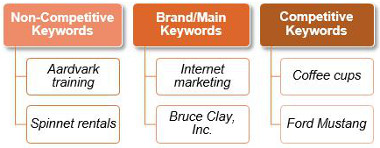Step 7: How to Optimize Website Content for SEO
Ready to launch some new content? Here’s where the rubber meets the road. This SEO tutorial step is LOADED with free tools and advice for how to optimize your website content according to what is natural among competitors. You’ll find our Single Page Analyzer and other free SEO tools below that are invaluable for measuring both your competitors’ and your own on-page content.
In this lesson:
- Learn guidelines for how much content is required.
- Run a free tool to find out specifically how much content YOU need for your web page optimization.
- Look at competitors’ critical page elements to help you optimize your own.
- Confirm that your web page content hits the mark using our most popular SEO tool.
How Many Keywords Per Page?

Photo by Cheryl (CC BY-SA 2.0), modified
In general, write each web page around one primary keyword phrase and up to two secondary. Focused content yields stronger keyword relevance and better-satisfied visitors, too, because the page delivers what they searched for.
Site-wide, you may have hundreds or thousands of active keywords assigned to different pages. Your keyword list can grow as your website grows, as long as you have enough content to support your relevance to each keyword.
Always be careful not to overuse, or “stuff,” keywords. As we stressed in Step 5, write for users naturally and go for quality. Just also incorporate keywords and related words strategically throughout the page (as explained in the previous step) to help search engines identify what your page is worthy of ranking for.
How Much Content is “Enough” for a Keyword?
To rank for a keyword, how much text per page and how many pages do you need?
Well, each page needs enough original text content to compete. The right amount will depend on what’s normal for that keyword. If all the top-ranking pages have 1000 words, then you’ll also need 1000 words of text. Competition aside, here are general SEO recommendations for page length:
- Research pages: 500 to 600 words minimum per page
- Ecommerce pages: 300 words minimum (shopping pages tend to have lots of product pictures)
- Blog posts: 200 words minimum per post

Examples of non-competitive, brand and competitive keywords.
As for how many pages will establish your relevance, you’ll need to match your competitors’ amount of content about that keyword. Here’s what to expect:
- Non-competitive keywords: One relevant, high-quality content page about the keyword might be enough to rank, if the keyword falls within your overall site themes.
- For competitive keywords: For tougher battles, you’ll need a landing page plus some subpages to support your subject relevance.
- Landing pages are where you want people to “land” when they come from a SERP. A landing page should offer keyword-focused content. It should give searchers what they expected to find and provide a good first impression of your site.
- Subpages link to/from the landing page and support its subject relevance with detailed, related content. (You’ll learn SEO tips for site architecture in Step 12 of this tutorial.)
- For brand/main keywords: Some keywords naturally appear across many pages, strengthening your relevance site-wide. For example, our website is packed with resources on “digital marketing” and “SEO,” our main service descriptions, and our brand name, “Bruce Clay, Inc.” Almost every page naturally uses those site-wide keywords, though each term still has its own focused landing page.
Compare Keyword Usage on Competing Pages
As you’re writing the title, meta description and other elements critical to your web page optimization, you may find it helpful to compare what your top competitors have written. Using our free SEO Multi-Page Information tool, you’ll be able to read the all-important title tag, meta tags, and H1 heading tag for many pages all at once, as well as whether the page has a rel=”canonical” tag.
Simply enter up to 6 URLs (one per line) and click Get Data below.
SEO Tool: SEO Multi-Page Information Tool
Test Your Web Page Optimization Using the Single Page Analyzer
The most popular search engine optimization tool in our entire SEOToolSet® is our Single Page Analyzer, which lists the top keywords plus a whole lot more. The free version below, provided for you as an essential part of this SEO tutorial, shows a small fraction of that tool’s power.
Running the Single Page Analyzer shows you the density for your keywords in the various categories: title, meta description, meta keywords, image alt attributes, heading levels, first 200 words, and total body copy. It also analyzes the reading level and other metrics, so make sure those are appropriate for the audience you’re targeting.
Following our specified SEO web page optimization methodology, you can review these reports to see what you need to change or add to your pages. SEOs often run this tool several times as they test and adjust their web page’s optimization. The Single Page Analyzer reports show red to indicate a value that is too low, and blue for a value that’s abnormally high, based on SEO best practices.
Enter the specific URL of your web page and click Run Page Analyzer.
SEO Tool: Single Page Analyzer
Placing keywords in the right spots with natural and reasonable frequency is critical for search engine optimization, but there is much more. You want your content to be the best it can be, and then just maybe you will be considered relevant. Expert content always does better than rambling text with randomly inserted keywords. Yes, you need the keywords, but you also need to make your content worthy.
If your content is not worthy, it does not belong on your website — fix it or remove it.
Now that you know how to optimize website content for SEO, next you’ll find out how to submit your site and help search engines find your web pages faster so your freshly optimized website content can be indexed.
Need more SEO tips?
Read more about Keyword Stuffing or Search Engine Optimization
The SEO Copywriting Checklist
Why Page Titles Matter
Quality Content Delivers Stellar Performance



